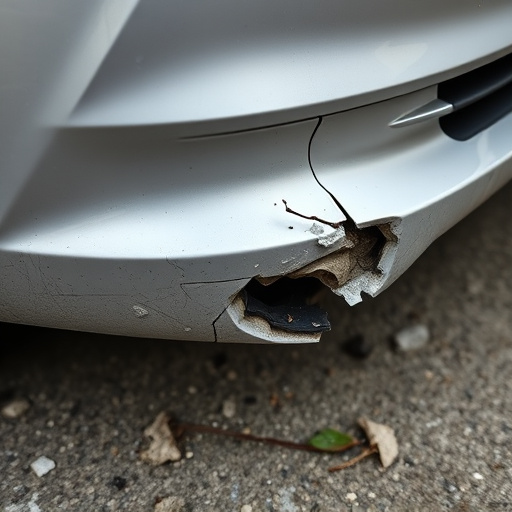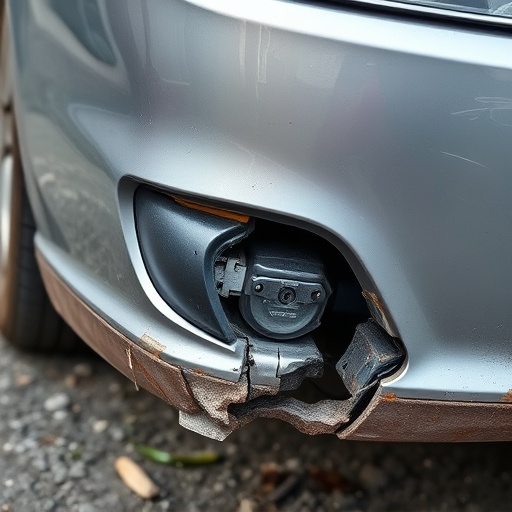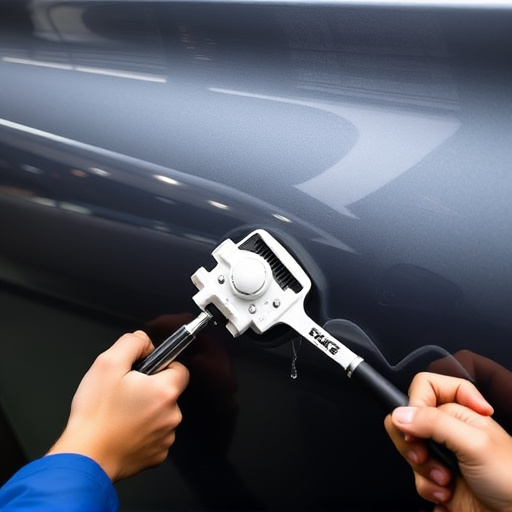Ultrasonic thickness gauges provide precise, non-destructive measurements using high-frequency sound waves, revolutionizing industries like automotive body repair by ensuring quick, accurate assessments without damaging vehicles. Versatile across various sectors, these gauges offer consistent results for material thickness, critical in bodywork repairs, industrial equipment integrity, and electronics manufacturing quality control.
In today’s precision manufacturing landscape, accurate material measurement is crucial. This is where ultrasonic thickness gauges shine as powerful tools, offering significant advantages over traditional manual methods. These non-destructive testing devices provide enhanced precision and speed, enabling efficient quality control. From metal sheets to composite materials, ultrasonic thickness gauges are versatile, making them an indispensable asset for various industries. Discover how this technology revolutionizes material handling and ensures consistent results in our comprehensive guide.
- Non-Destructive Testing: Ultrasonic Gauges vs Manual Methods
- Enhanced Precision and Speed: The Advantages of Ultrasonic Technology
- Versatility in Applications: When to Use an Ultrasonic Thickness Gauge
Non-Destructive Testing: Ultrasonic Gauges vs Manual Methods

In the realm of non-destructive testing, ultrasonic thickness gauges stand out as a game-changer compared to traditional manual methods. One of the most significant advantages is their ability to provide precise measurements without causing any damage to the material being tested. This is particularly crucial in industries like automotive body shops and collision repair services where preserving the integrity of vehicles is paramount. Manual tools, often relying on subjective human assessment, can be inconsistent and time-consuming, whereas ultrasonic gauges offer quick and accurate results.
Ultrasonic thickness gauges emit high-frequency sound waves that penetrate the material and bounce back, allowing technicians to calculate the thickness with remarkable accuracy. This non-invasive approach ensures that auto repair near you doesn’t suffer any damage or alteration during the testing process. As a result, collision repair services can streamline their operations, improve quality control, and ultimately provide better service to customers.
Enhanced Precision and Speed: The Advantages of Ultrasonic Technology

Ultrasonic thickness gauges offer a significant leap forward in precision and speed compared to traditional manual tools. By utilizing high-frequency sound waves, these advanced devices can accurately measure material thickness with remarkable efficiency. This technology ensures consistent and repeatable results, reducing human error that often plagues manual measurements.
In the context of automotive repair services and collision repair shops, the advantages are clear. Ultrasonic thickness gauges enable quick assessments of vehicle body panels, especially after dent repairs or restructuring. For instance, in a vehicle dent repair scenario, this technology can swiftly determine if a panel has been correctly restored to its original specifications, ensuring both structural integrity and aesthetic precision.
Versatility in Applications: When to Use an Ultrasonic Thickness Gauge

An ultrasonic thickness gauge offers unparalleled versatility across various industries and applications. Its non-destructive nature makes it ideal for measuring the thickness of materials used in diverse sectors, from automotive manufacturing to construction. In car bodywork and body repair, for instance, this technology is invaluable for accurately assessing damage after a vehicle collision repair, ensuring precise panel replacement and seamless integration.
Whether you’re dealing with metal sheets, plastic components, or composite materials, an ultrasonic thickness gauge provides consistent and reliable measurements. This makes it a go-to tool in industries where material thickness plays a critical role in product quality and performance. From ensuring the integrity of industrial equipment to quality control in electronics manufacturing, this innovative device adapts to meet diverse needs with remarkable ease.
Ultrasonic thickness gauges offer a significant leap forward in precision, speed, and versatility compared to manual testing methods. By providing non-destructive testing solutions, these tools enable quicker, more efficient material analysis across various industries. The adoption of ultrasonic technology ensures accurate measurements, reduces human error, and streamlines processes. When selecting a thickness gauge, consider the specific application requirements to unlock the full potential of this innovative tool, making it an indispensable asset for modern workshops and labs.














